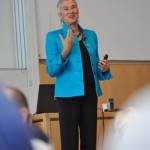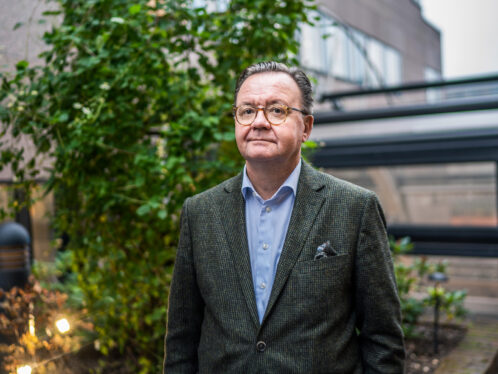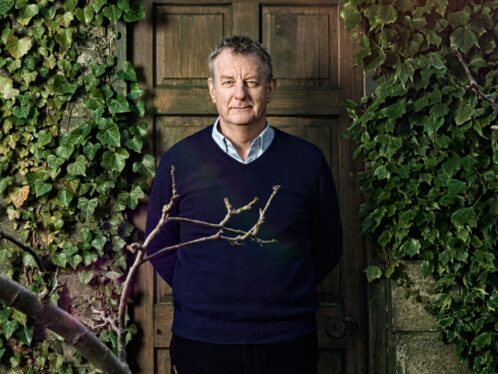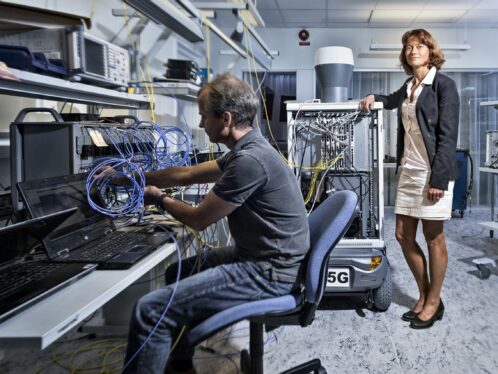The flip side to everything
Most people would agree that spirituality and business are at opposite ends of the spectrum. But somehow they come together in the person of Diana Whitney.
If you’re looking for a US state with variety, look no further than North Carolina. From its impressive mountains to its sublime seacoast, it is the very embodiment of diversity. Even its economy encompasses an established agricultural sector, alongside both industrial and high-tech corporations. It’s also home to Corporation for Positive Change (CPC), a consulting firm that focuses on leadership and organizational development to introduce change in a wide range of diverse fields. CPC consultants specialize in using Appreciative Inquiry (AI) for organizational transformation and innovation in business, government, education and health care and at non-profit organizations around the world. CPC President Diana Whitney is the author of 15 books about AI, a relatively unknown but growing methodology for implementing change management, by focusing on the positive rather than the negative. “In the last 30 years of psychological research, there have been 45,000 papers addressing depression, but only 300 studies address what happens with joy, happiness and hope,” says Whitney. “AI is based on the idea that human and organizational change requires large amounts of positive emotions like confidence, hope and courage. By focusing on patterns of success, strengths and what works in organizations, AI creates a positive emotional environment. When people feel good they perform better, they cooperate more, and they are more creative.” Just like Six Sigma, Total Quality and other change management initiatives, AI may seem simplistic on the surface but its implementation in an organization requires a lot of methodology, some hard work and a leap of faith. Whitney, one of the leading voices in this burgeoning field, was attracted to AI from her studies in innovation and social systems and because the positive strength-based message of AI fits with her continuing spiritual practices. Whitney likes to turn things upside down. “Take a hospital that investigated why they have such a high turnover of nurses,” she explains. “When they studied retention instead and found the reasons why nurses stayed and fostered those across the hospital, all sorts of things changed, including patient satisfaction with nurses. AI is all about being positive and creating upward spirals of performance by studying and talking about what you want more of in your life and organization. There is no magic wand. It has to be practiced. It takes work to stop asking questions about what went wrong and instead become a student of what creates success.” Equal parts provocateur, inspirational speaker, writer and educator, Whitney has made a career crisscrossing the globe – Japan, India, Korea, Sweden and South Africa – to speak to companies, organizations and management schools about AI. Her ideas run the gamut of psychology, sociology, management theory and spirituality. The fields in which CPC works span the very spectrum of human activity and interest, from health care to education, from peace building to business, from community development to government and religion. Whitney coaches executives and their teams in support of organization culture transformation, strategic development and leadership capacity building. Whitney has more than 30 years of experience, with a client list that includes Merck, British Airways, Verizon, J&J, Calgary Health Region, University of Virginia Health System, Idaho Department of Education and Sisters of the Good Shepherd. The American Society for Training and Development recognized her AI work at GTE (Verizon) with its Best Culture Change of the Year award in 1999. AI was founded in 1985 when a team from Case Western Reserve University’s Weatherhead School of Management in Cleveland, Ohio, spearheaded by David Cooperrider, was engaged to consult with a local clinic that was consistently ranked as one of the best in the country. As the team queried the clinic’s employees about the positive aspects of their work, a wave of energy was unleashed. The factors that had contributed to the clinic’s success were actually enhanced by the interview process. “There is no such thing as objective research,” says Whitney. “The questions you ask most definitely affect the results you are going to get. So instead of working from a problem-solving perspective, try to find out what people are good at and passionate about and build on that. “You might as well ask the questions that give you the benefits you seek,” she says. Whitney recalls the time when her son moved to California to practice law. After only a few months he called, saying he did not want to practice law or live in California. Most parents would try to deflect the situation with questions about what he planned to do in the future – jobs and so on. Whitney’s question: “When were you the happiest?” “In case you are curious, today my son is a successful entrepreneur, operating an international business importing goods from Central America to the US,” says Whitney. Whitney tells this story to illustrate the import-ance of asking questions about what we really value. She feels that, as parents and leaders, our questions tell others what we care about and what we expect. “So if you want greater collaboration, ask people to tell you about times of surprising collaboration,” she says. At a speech workshop held at the University of Gothenburg’s School of Business, Economics and Law in April 2011, Whitney closed her presentation about Appreciative Inquiry with a story, “A tale of two wolves,” about a Cherokee Native American grandfather talking to his grandson. “Inside all of us there are two wolves, one good and one bad,” she explains. “The good one appreciates beauty, is caring and helps the community. The bad one is mean, critical and angry. They fight among each other, but which one wins? “The one you feed,” she says, “and that is Appreciative Inquiry.”






